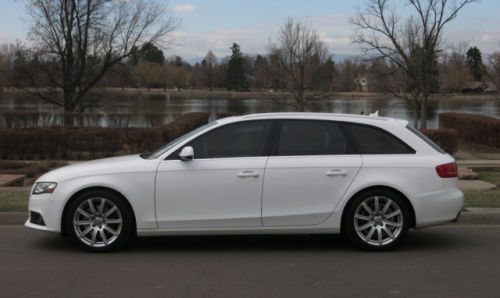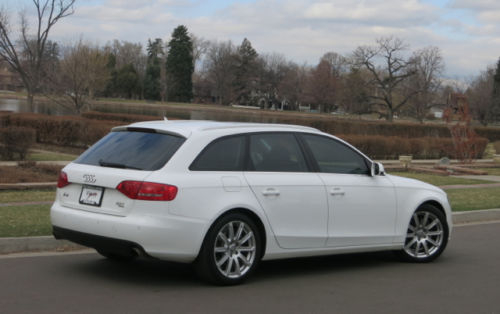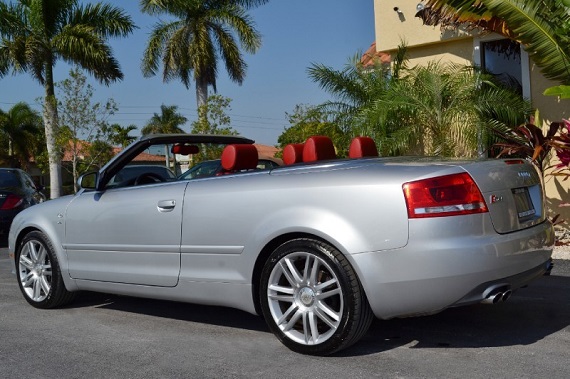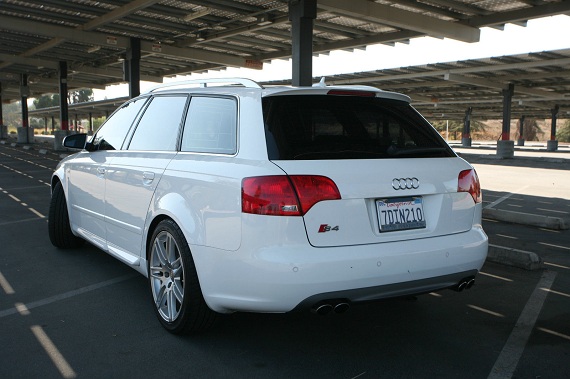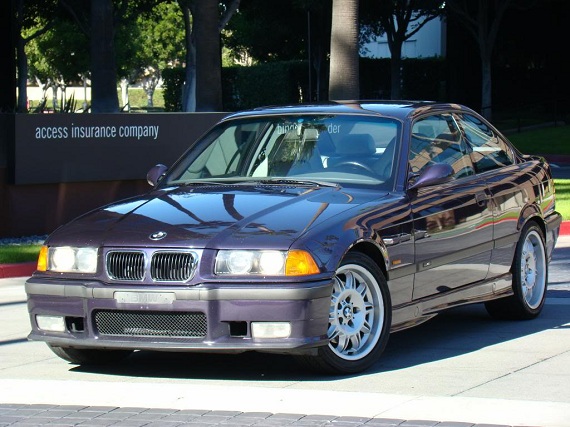When Audi launched the A4 Avant with the B5 series, it was a bit of a trump card for the small wagon enthusiast. True, the Volkswagen Passat had been available in 5-door form for a few generations, and it VR6 form it was quite entertaining. However, quality of the pre-B5 chassis Passats wasn’t the best, and all-wheel drive had only been available with the Quantum for a few short years in the late 1980s. Audi had offered its unique large Avant platform in both 5000/200 and S6 form, but they were pretty expensive relative to the small cars the company offered. The A4 Avant continued on for through the B7 chassis we saw yesterday; a serious improvement in looks over the rather plain looking B6. When the B8 launched, initially I thought “There goes Audi again, following the formula of making everything bigger”. The B8 was a LOT bigger than the original A4 had been; in fact, park one next to an original A6, and the B8 A4 is dimensionally it was only slightly smaller. There was one key difference, though. Sure, the A4 had been stretched in every direction – but most importantly, you’d find that the wheel base was now the best part of a foot longer than the early Audi platforms. Visually that shortened the notoriously long overhangs of the Audis and offered more legroom to the occupants. Anyone who has ever been in the back of a B5 A4 would certainly appreciate that. Amazingly, too, the new A4 was lighter, and thanks to revised suspension geometry, new and more advanced computers and a torque-laden 2.0 turbo motor, it felt and drove considerably better than any of the previous generations had, too. It even looked really good in my mind. It was an instant success as previous generations had been, making one wonder even more why it went away:
Tag: 2.0T
Audi’s flirtation with chopped top mid-range sedans has always been an interesting one. Starting with the B4 series, Audi combined the front-drive 90 platform with parts of the Coupe platform to create the handsome and understated Cabriolet model. While not much of a performance machine, it was a good looking and reasonably sensible choice for a luxury 4-seat German convertible. It was not particularly sporty though; while Europe saw a range of engines, the U.S. received only front drive 4-speed automatic V6 models. The B4 model long outlived the rest of its siblings, soldiering on until 1998 when it was seemingly replaced by the TT model. The Roadster model wouldn’t be available until 2001, but the promise of an all-new convertible that was much sportier seemed logical. However, Audi returned to the 4-seat drop top market in 2003 with the A4 based Cabriolet model. Based initially on the B6 platform, it then seemed natural that Audi would finally offer a performance variant to compete against the popular M3 convertible; however, unlike the B3/B4 platform which had a Coupe model, there was no A4 based Coupe. To solve this problem, Audi’s skunkworks quattro GmbH undertook modifying the platform to create the 2006 S4 cabriolet.
Now, on the surface, this was a bit strange. Beyond the question of why you need a really fast convertible, you now had the question of why you needed an all-wheel drive convertible. But the Audi offered great looks, a stunning soundtrack and some trick interiors and flashy exterior colors to really help set the S4 apart. But many of the S4s were coupled with automatic transmissions; coupled with the chain problems the V8 heart is now known for, if you want a B7 cabriolet is it now smarter to consider the less flashy models?
CLICK FOR DETAILS: 2007 Audi S4 Cabriolet on eBay
3 CommentsAt the risk of sounding a bit like a grumpy old man, I really miss the days of Audi yore. Audi did things differently for such a long time that it’s a bit disappointing to see more designs that mimic their contemporaries. I realize part of that has resulted from a realization that the market dictates what is popular, and Audi’s huge sales successes in recent years are no doubt the product of producing more mainstream vehicles that sell. But the result of that is that Audi has stepped away from part of what made them such a fan favorite; starting in 1986, Audi began offering fast wagons. At the time, that was unique to the market – BMW didn’t even offer a wagon stateside until the E34 Touring, and most of the Mercedes-Benz models didn’t really fit in with the fast motorsport enthusiast crowd. Audi furthered its reputation in the early 1990s, expanding the fast wagon lineup from just the large wagons with the introduction of the 20V Turbo version of the B4, the S2 and later RS2. Refining the 200 20V into the S4 Avant in C4 form, Audi broadened the engine range to V8 and turbo 5 offerings – continued in the C4 S6 Avant. There was a brief lull in sport between the death of the C4 and the introduction of the B5 S4, but Audi rebounded in style; the B5 A4 was a popular sporty small wagon and the S4 Avant turned that package up a notch. Then Audi simulatenously offered 4 versions of the C5 platform wagon; regular A6, A6 Allroad (with both twin-turbo and V8 options), S6 and RS6 Avant. The RS package revisited the small wagon in the RS4, and suddenly Audi had no less than 8 different sporting versions of wagons in the early 2000s – the height of their power, they were the undeniable fast wagon kings. While we didn’t get all of those cars, we still got a respectably large amount of fast 5-doors; but slowly, over time, Audi killed off its offerings one by one. First to go was the S6 Avant – slow on sales and not as much of a favorite as the C4 had been, that made sense – the similar sized B6 S4 4.2 Avant was, after all, available with a 6-speed and it was silly to offer both. So we soldiered on with a new C6 platform, and I was glad to see the Avant continue on. The C6 was larger and sleeker and certainly a looker; but no S6 Avant made it to the U.S. any more. Audi also killed off the Allroad soon after; a huge sales success, it nevertheless decided to pursue the SUV market instead of bringing the larger C6 Allroad over here. But we still had three different engine choices in the B6 and B7 platform Avants, right? Well, then Audi started killing them off – with the end of the B7, the S4 Avant was pulled from these shores, along with the larger engine A4 Avant. That left us with only the 2.0T A4 and 3.0T A6 Avants – Audi added the A4 Allroad recently, but in exchange we lost both of the last normal Avant holdouts, too. Drive down to your local Audi dealer, and you can no longer buy a normal wagon. They’ve got 15 different “SUV” options, but wagon fans are limited just to the 2.0T automatic Allroad. It’s a shame.
So, for the swan song to Wagon Week, I’ve selected not the best year or best models for our sendoff – but it’s the last stand of when we were offered three sporting options; 2009 would see that number down to two and then one shortly thereafter. Don’t shed a tear, but remember the good times:
CLICK FOR DETAILS: 2008 Audi S4 Avant on eBay
9 CommentsWell, I hope this will stir some interest, as I think this is a bit of an interesting comparison. What level of performance can you buy for $10,000 (give or take) these days? Surprisingly, there are a lot of options – and those options vary pretty seriously in their execution and packages; there’s a wagon and a sports car, two sedan-based coupes and a hatchback. Engines range from a 2 liter turbo to a V8, with a bit of everything in between. Yet, what appears to be a very strange comparison linked only by price is revealed to be much closer when you look at performance figures:
E36 M3: 240 hp, 0-60 6.0 seconds, 3,200 lbs
944 Turbo: 220 hp, 0-60 5.9 seconds, 2,900 lbs
CLK500: 302 hp, 0-60 5.7 seconds, 3,800 lbs
S4 Avant: 250 hp, 0-60 5.6 seconds, 3,700 lbs
GTi: 200 hp, 0-60 6.6 seconds, 3,200 lbs
The range is much closer than you’d expect – especially when you consider that these figures could easily be equaled in margin of error, driver skill and reaction time. In the twisties, the lower powered cars like the GTi catch up to the higher power CLK and S4. All are, in one way or another, practical choices. Some are destined (or already) classics, while others will likely fade away. So what would be your choice? Let’s start with an M3 we’ve already seen:
CLICK FOR DETAILS: 1999 BMW M3 on eBay
13 CommentsFor the several years I lived in San Francisco, the A3 was a ubiquitous but understandable yuppie choice. Good luxury, decent utility and speed with a good measure of the all-important parkability make it a great choice for cityfolk. My college girlfriend had an A4 2.0T that I very much enjoyed wringing out, even if it wheezed a little at the top end. The quick and available tuning options would be very tempting for me, and a dark-grey dart on RS4 wheels sounds like a killer commuter. A well-explained fender-bender knocks this one’s history but helps bring the price down to a level where, with just over 50k miles, it should move very quickly.
